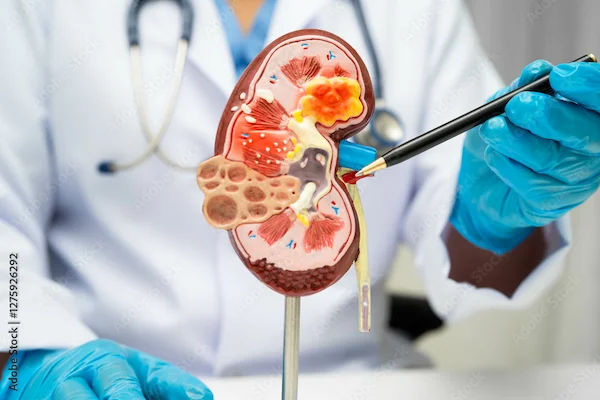How Long Does It Take To Heal From Kidney Transplant?
Discover how long it takes to heal from a kidney transplant, including recovery timelines, key post-operative care tips, and factors that affect healing. Learn what to expect on your journey to recovery.

Written by
Last updated on 17th Jul, 2025
_11.webp)
Introduction
A kidney transplant is a life-changing procedure that can significantly improve the quality of life for individuals with end-stage kidney disease. However, recovery after a kidney transplant is a gradual process that requires patience, care, and adherence to medical advice. If you or a loved one has recently undergone or is planning for a kidney transplant, understanding the healing timeline can help set realistic expectations and ensure a smoother recovery.
Understanding the Kidney Transplant Recovery Process
Recovery from a kidney transplant varies from person to person, but generally, it can be divided into different phases:
1. Immediate Recovery (First Few Days After Surgery)
Hospital Stay: Most patients stay in the hospital for about 5 to 10 days after surgery. During this time, doctors monitor kidney function, pain levels, and any signs of complications.
Pain Management: You may experience soreness around the surgical site, but pain medications will help.
Early Mobility: You’ll be encouraged to walk gently within a day or two to prevent blood clots and improve circulation.
2. Short-Term Recovery (First 4-6 Weeks After Surgery)
Wound Healing: The surgical incision takes about 2-4 weeks to heal fully. Keep the area clean and dry to prevent infections.
Medication Adjustments: You’ll start taking immunosuppressants (anti-rejection drugs) to prevent your body from rejecting the new kidney. These medications require strict adherence.
Follow-Up Visits: Frequent check-ups with your transplant team are necessary to monitor kidney function and adjust medications.
3. Long-Term Recovery (3-6 Months and Beyond)
Returning to Normal Activities: Most patients can resume light activities within 6-8 weeks, but full recovery may take 3-6 months or longer.
Diet and Exercise: A balanced diet (low in salt and processed foods) and light exercise (like walking) help in recovery.
Lifelong Care: Regular blood tests, doctor visits, and medication adherence are crucial for long-term kidney health.
Consult Top Nephrologists
Factors That Affect Healing Time
Several factors influence how quickly you recover:
Overall Health: Younger, healthier patients often recover faster.
Type of Donor Kidney: A living donor kidney may start working immediately, while a deceased donor kidney might take a few days.
Complications: Infections, rejection episodes, or other health issues can prolong recovery.
Tips for a Smooth Recovery
Some of the tips for a smooth recovery after kidney transplant are:
1. Take Medications as Prescribed: Missing doses can increase the risk of rejection.
2. Stay Hydrated: Drink enough water (as advised by your doctor) to help your new kidney function well.
3. Avoid Infections: Wash hands frequently, avoid crowded places initially, and stay up-to-date on vaccinations.
4. Follow a Kidney-Friendly Diet: Limit salt, potassium, and phosphorus; include lean proteins and fresh vegetables.
5. Monitor for Warning Signs: Fever, swelling, decreased urine output, or pain at the transplant site require immediate medical attention.
When Can You Return to Work?
Timelines for returning to work are as follows:
Desk jobs: 6-8 weeks
Physically demanding jobs: 3-6 months (or as advised by your doctor).
Emotional Recovery
A kidney transplant is not just physically demanding but can also be emotionally challenging. Feelings of anxiety, gratitude, or even guilt (if receiving from a living donor) are normal. Seek support from family, friends, or counselling if needed.
When to Seek Help?
Contact your transplant team immediately if you notice:
High fever or chills
Severe pain near the new kidney
Sudden weight gain (could indicate fluid retention)
Reduced urine output
Conclusion
Healing from a kidney transplant is a journey that requires time, discipline, and support. While the initial recovery may take weeks, full adaptation to your new kidney can take several months. By following medical advice, maintaining a healthy lifestyle, and staying vigilant, you can enjoy a better quality of life post-transplant.
Consult Top Nephrologist
Consult Top Nephrologists

Dr. Govardhan Gupta
Nephrologist
15 Years • MBBS, DNB General Medicine, DrNB Nephrology
Mumbai
Oscar Superspeciality Hospital, Mumbai

Dr. S Bipin Kumar
Nephrologist
13 Years • MBBS, MD General Medicine, DM, Nephrology
Rajamahendravaram
SG KIDNEY CARE, Rajamahendravaram

Dr. Luvdeep Dogra
Nephrologist
10 Years • MBBS, MD, DM (NEPHORLOGY)
Jaipur
Dr Dogras Health Clinic, Jaipur
Dr Sanjai Maitra
Nephrologist
24 Years • MBBS, MD (Int. Med.), DM (Nephro)
Siliguri
Atrium Diagnostics, Siliguri

Dr. Siddharth Herur
Nephrologist
4 Years • MBBS, MD General Medicine, DM Nephrology
Kurnool
Medicover hospital and Gurudatta poly clinic, Kurnool
Consult Top Nephrologist

Dr. Govardhan Gupta
Nephrologist
15 Years • MBBS, DNB General Medicine, DrNB Nephrology
Mumbai
Oscar Superspeciality Hospital, Mumbai

Dr. S Bipin Kumar
Nephrologist
13 Years • MBBS, MD General Medicine, DM, Nephrology
Rajamahendravaram
SG KIDNEY CARE, Rajamahendravaram

Dr. Luvdeep Dogra
Nephrologist
10 Years • MBBS, MD, DM (NEPHORLOGY)
Jaipur
Dr Dogras Health Clinic, Jaipur
Dr Sanjai Maitra
Nephrologist
24 Years • MBBS, MD (Int. Med.), DM (Nephro)
Siliguri
Atrium Diagnostics, Siliguri

Dr. Siddharth Herur
Nephrologist
4 Years • MBBS, MD General Medicine, DM Nephrology
Kurnool
Medicover hospital and Gurudatta poly clinic, Kurnool
_2.webp)

